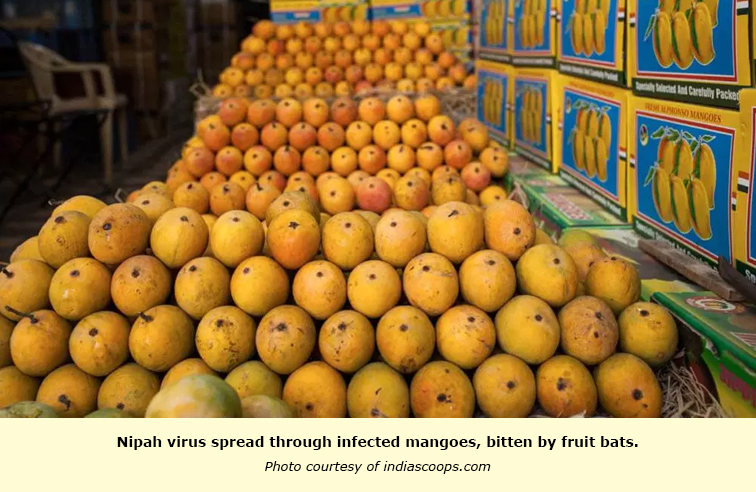Reports attributing the Nipah virus outbreak to fruit bats (herbivorous bats which chiefly consume fruits) has come as a dampener for fruit vendors, especially those selling mangoes. According to a report in the BBC, fruit bats are considered to be the natural host of the virus.

Health officials in Kerala said they had found mangoes bitten by bats in a home where three people died of the suspected infection, reports the BBC. People in Kerala and even parts of Karnataka and Goa have begun avoiding mangoes since reports began tickling in that Mangoes could cause the spread of the Nipah virus.
For despite it being one of the seasons during which fruits are in much demand, the reports are making people think twice before venturing out to buy fruits, reports The New Indian Express.
‘Express’ talked to a few fruit vendors in the city and found only fruits such as mangoes, especially those procured locally, are not finding takers.
“The sale of local mangoes has gone down since the news broke. But people are buying mangoes brought from neighbouring states. Reports that fruits like mango, guava and chikoo are bats’ favourite diet are putting off people,” said Jaison of PJJ Fruits. He said apples, grapes, oranges, mosambi and bananas were being sold as usual. “We can provide guarantees for the quality apples, kiwis and other fruits since they are brought here after undergoing an extensive treatment process,” he said. Jaison said it was sad the fruits sales were declining.
“These are the when we see maximum sales thanks to Ramadan and the fluctuating temperature,” he said. Vendors at Kaloor market and nearby places said they have adopted various measures to prevent the fruits from getting contamination of being eaten by animals.
“The best way to protect the fruits from rodents and bats is to cover them with plastic sheets, keep them in boxes and not leave them unattended especially at nights when the animals are most active,” said a vendor.
Walking through the market, one can see most fruit shops disposing of the fruits which have gone bad. However, smaller shops chop off the spoiled parts and sell the fruits at lower prices.
Direct contact with infected pigs, other infected animals or through contaminated fruits (half-eaten fruits left by fruit bats), and even direct contact with sick persons are the underlying cause of outbreaks, say the experts. They say the Nipah virus can also spread through water if the fruits are washed using water which has been contaminated with a bat’s excreta.
A big put off
Those who follow a fruit-based diet have been hit the worst.
“I am going to refrain from eating fruits, especially mangoes, for a while. It is less time-consuming than checking each and every fruit for bite marks or scratches. Why take chances?” said Indira, who followed a strict fruit diet.
For Sini Sebastian, a counsellor, bananas are the best bet. “You can easily identify a damaged fruit. So I will be more confident while buying bananas than I will be while buying mangoes or guavas,” said Sini.
Vasanthakumari, a homemaker, said it was best to grow your own fruits and vegetables. “This way, you can ensure quality. In the case of guavas and bananas, I make sure the fruits are well-covered to protect them from bats and other animals. I even wash them in turmeric water and organic fruit washing solution,” she said.
Protecting the fruit treasure
According to Anitha Binoy, a homemaker, said the best way to protect the fruits was to cover them. “In the case of trees like rambutan and sapotta, farmers use nets. They cover the entire trees to save the fruits from bats. For guavas and bananas, bags are used. In the case of guavas, individual fruits are covered using plastic bags. For bananas, sacks or even the leaves of the plant are used,” she said.
The bats only attack some fruits, said George Thomas, Dean, Horticulture College, Thrissur. “They do not attack jackfruit, but relish mangoes, rambutan and sapotta or chikoo, because the fruits have soft skins,” he said.
Source: Times of India
